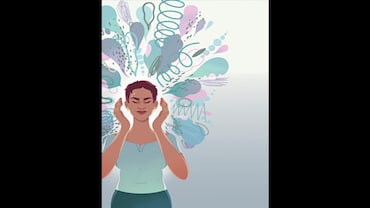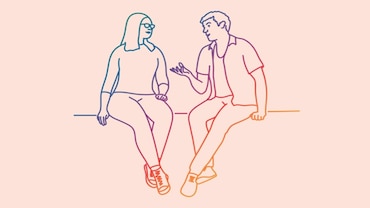- HOME
- /
- Better Living
- /
- Life Skills
- /
Why It's So Hard To Take Advice
More often than we expect, the best advice comes not from experts or our friends but from humbler sources. We just have to be willing to hear them
 Photograph by Molly Richardson
Photograph by Molly Richardson
One morning in July 2011, a taxi sat idling outside Petco Park stadium in San Diego, and Wade LeBlanc, a struggling pitcher for the Padres, climbed in. “To the airport, please,” he told the driver. LeBlanc was headed to Tucson, Arizona, home of the club’s triple-A affiliate at the time. He’d been sent down to the minors. Again. For the eighth time in three years.
“You’re Wade LeBlanc,” the cab driver said.
“Right.”
“You got some good stuff.”
This surprised the pitcher, after the previous night’s disastrous performance.
“I think there are some things you should think about trying,” the driver continued. “I don’t know; I’m not a player. Maybe something like going over your head in your wind-up.”
Wait, what? This guy was offering ... advice? Earlier in his career, LeBlanc might have laughed. Or been angry. But today, he just listened. He couldn’t afford to dismiss anything. His career was on the line.
The next day, in Tucson, LeBlanc huddled up with the pitching coach. He said he was thinking about tinkering with his wind-up. Instead of keeping his hands tight to his chest at the beginning of his delivery, he raised them briefly over his head, as the cabbie had suggested.
LeBlanc incorporated the new move into his next start. And he was brilliant, allowing only one hit over seven innings. It was, in retrospect, the turning point in his career. Eight years later, LeBlanc is a pitcher for the Seattle Mariners. He signed the first contract extension of his Major League baseball career—at age 33.
The funny thing about advice: We so often take it from the wrong people. That is, we overvalue the advice of credentialled experts while undervaluing the input of regular folk. Wade LeBlanc bucked that trend big-time, and he reaped the benefits.
One reason taking advice is problematic for many of us is that status matters—a lot. A cognitive quirk called optimism bias endows most of us with a general hopefulness that things will work out even when the odds suggest otherwise. And optimism bias gets ratcheted up, researchers have found, when the person offering advice is seen as an expert. The expert’s bona fides boost the expectation of success if we listen to them—even though our confidence often proves wrong.
“Expert advisers often make surprisingly inaccurate predictions about the future, yet people heed their suggestions nonetheless,” concluded Stanford University psychologists in a study published last year.
Now, not everyone heeds experts’ advice. The more successful people become, the smaller the pool of advisers they trust. Participants in positions of power ignored almost two-thirds of the advice they received, according to one Harvard University study. Other participants—the control and low-power groups—ignored advice about half as often. So it required a massive leap of modesty to do what Wade LeBlanc did: hear what the taxi-cab driver was offering him and accept it as a gift.
A couple of years ago, film-maker M. Night Shyamalan found himself in a similar spot as LeBlanc—and likewise benefited from advice from a humble source. This time it wasn’t a taxi driver, but a movie critic.
After the huge commercial and critical success of The Sixth Sense, Shyamalan’s fortunes had grown cloudier. Box office for his later movies was decent, but the critics had turned on him. One likened his psychological thriller The Village to an episode of Scooby-Doo. Instead of shrugging off this critic, Shyamalan wondered whether there might be something to the pan.
His signature as a film-maker was a kind of genre-bending twist: You think you’re watching one kind of film, and then it morphs into something diffe-rent. A drama becomes a psychological thriller. A psychological thriller goes supernatural. Each transition shifts the intensity. But for the technique to work, the intensity must escalate. In The Village, it didn’t. Shyamalan shelved his ego and took the criticism to heart. ‘Don’t pretend you’re not hurt by what that dude just said’ was what Shyamalan took away from the experience. Instead, he decided to go with it.
The director doubled down on his signature shape-shifting style for his next film, Split, which told the story of a man with 24 personalities. His own agent didn’t think he could sell it, so Shyamalan financed the $9 million film himself. It made more than $270 million and became one of the most profitable pictures of 2017. It also won back his critics.
Most of us aren’t much good at taking advice from anyone. We tend to put more stock in our own opinions than the opinions of others, owing to yet another cognitive blind spot called egocentric bias. It’s frankly easier to believe that our critics are too thick to grasp our genius, or are jealous, or have some kind of agenda, than to allow that they may be right.
The required leap of humility is a big ask. One useful trick comes from Eastern philosophy. According to the Korean Zen monk Haemin Sunim, when someone’s coming at you with reproval, that’s when you need to lower your defences, not raise them. “Those who give you a hard time, they are your teachers in disguise.”






